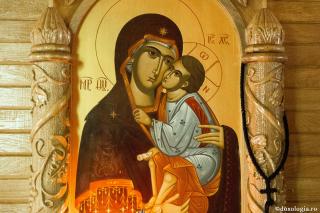The saints who are watching for us – a life changing friendship
Through their humbleness, saints usually pass unnoticed but they make their presence felt when people need support, comfort and cheering. They are always next to those who have abandoned them. To them, there is no such thing as an insurmountable difficulty or obstacle when it comes to help someone in a desperate situation. They become one’s best friends, the ones that make you feel comfortable near them but who, at the same time, make you feel embarrassed by your own moral shortcomings and sins.
In the person of the saints, through their availability in relationship, their attention towards the other their readiness that give themselves to God, humanity is cured and renewed. How precisely is manifested this renewed humanity? Saints manifest towards every human being a behaviour filled with delicacy, transparency and purity both in thought and feelings. Their delicacy is manifested even towards animals and things, because they see in everything a gift of the love of God, and they do not want to hurt this love by treating these gifts with indifference and careless. They respect every human being and every single thing, and if a man or animal is in suffering, they manifest a deep suffering.
Saint Isaac the Syrian says about the compassion of the saints that “what is a soul, a heart filled with compassion? It is the heart beating for the entire creation – for people, for animals, for birds, for creeping things, even for the devils. Thinking about them or seeing them, makes the saints shed numerous tears. And the deep and intense suffering that rules over saints’ heart makes them unable to bear the sight of the smallest wound of a creature, no matter how small it is. For this reason, they pray incessantly, shedding tears even for the animals, the enemies of the truth and those who do harm.”
This compassion reveals a delicate, extremely sensitive and devoid of any indifference and brutality. It is the proof that severity is the fruit of sin and passion. In the saints’ behaviour, or even in their thought, we cannot find any trace of vulgarity, meanness and pettiness, no trace of a lack of sincerity. They are a monument of delicacy, sensitivity, transparency accompanied by purity, generous attention towards people, availability towards their problems and sorrows. In all these qualities there is an excellent manifestation of humanity. In their delicacy, they do not avoid the contact with the most humble people and are not afraid of embarrassing situations.
Thanks to their conscience whose sensibility was nurtured and perfected by God who became Man for the sake of humans, saints perceive even the most discrete state of mind of others and avoid everything that might displease them, while helping them to overcome their weaknesses and difficulties. This is the reason why, saints are usually seen as confidents of our most personal secrets. Because they are able to read in others even the smallest need, all the good things that they might wish for. And then, they haste to fulfil this wish and dedicate themselves completely to this purpose. However, saints are also able to read others’ filthiness, even when they try to hide it. Their compassion becomes then a purifier through their own purity and the sufferance provoked by the mean intentions or desires of the others, keeping into their soul all this sufferance.
In all these situations, they know how and when they should interfere. They also know when to remain silent and why. This subtle reasoning of the saints, a noble manifestation of their distinction, can be considered a sort of “pastoral diplomacy.”
From saints, there is always an overflow of generosity, self-sacrifice, attention, involvement, communion, lack of self-care and warmth that is keeping others warm and gives them the feeling they have become more powerful and that are no longer alone. Saints are the innocent lamb, always ready to sacrifice themselves and take over the sufferance of others but also an unshakable supporting wall.
According to Saint Maxim the Confessor, saints have achieved pure simplicity because they have surpassed in themselves any duality or duplicity. They have overcome the fight between body and soul, good intentions and their acts, mischievous appearances and hidden thoughts, between what we claim to be and what we really are. They have “simplified” themselves because they have entrusted into God. This is the reason why they can engage themselves completely in the relationship with people. If they sometimes avoid naming with brutality their weaknesses, they do in order not to discourage them, so that in themselves will flower delicacy, shame, gratitude, simplicity and sincerity. Saints are always encouraging people.
Through their humbleness, saints usually pass unnoticed but they make their presence felt when people need support, comfort and cheering. They are always next to those who have abandoned them. To them, there is no such thing as an insurmountable difficulty or obstacle when it comes to help someone in a desperate situation.
They become one’s best friends, the ones that make you feel comfortable near them but who, at the same time, make you feel embarrassed by your own moral shortcomings and sins. Saints overwhelm you through the simple greatness of their purity and the warmth of their kindness, embarrassing you for your low level of morality, for your twisted humanity, for your falsity, impurity and duplicity.
Saints bear Christ in them, with the invincible power of His love for the salvation of mankind. Saints represent the humanity purified by the ashes of the inhuman. They are the rehabilitation of humanity mutilated by bestiality. They represent humanity whose restored transparency allows to foresee the model of unbounded kindness, power and infinite sensitivity that is the incarnated God. They are the restored face of the living Absolute who became man, a peak of breath-taking height but also of a familiar vicinity through their perfected humanity in God. They are the persons engaged in a truly open and incessant dialogue with God and people. They are the maximum reflection of Christ’s humanity.
(Translation from a fragment Pr. Prof. Dumitru Stăniloae’s book, Rugăciunea lui Iisus și experiența Duhului Sfânt, Editura Deisis)





